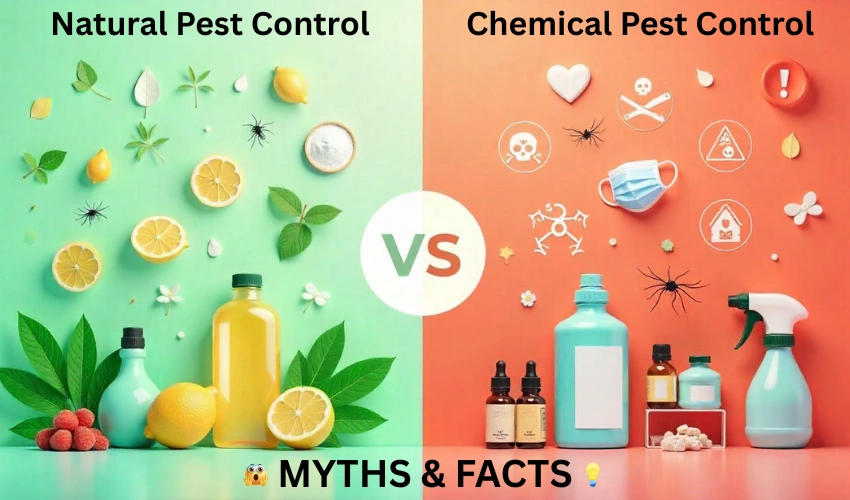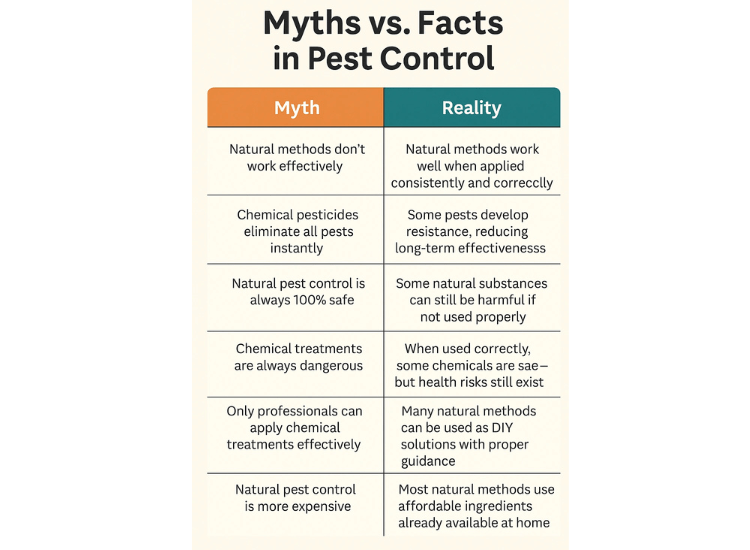Natural Pest Control vs. Chemical Pest Control: Myths & Facts
- Home
- Natural Pest Control vs. Chemical Pest Control: Myths & Facts





The debate between natural pest control/chemical pest control has been ongoing for years, with many people unsure of which option is the safest and most effective. Many people think that natural treatments are slow or useless and that only chemical solutions can eliminate pests. But that’s only one of the numerous myths we’ll dispel today. The argument between natural and chemical pest treatment is more pertinent than ever as pests become more robust and families become more aware of the effects on their health and the environment.
In this blog, we’ll break down myths and facts and compare both methods in terms of safety, effectiveness, cost, and long-term impact, helping you make an informed choice that suits your home and health.

Chemical insecticides are a common option since they frequently produce immediate and apparent results. However, they don’t always ensure sustained protection. While chemical pest control may offer quick results, natural pest control targets the root cause, providing long-lasting benefits without the risk of pest resistance
Natural pest management techniques, on the other hand, may take longer to produce results, but they frequently address the underlying cause by upsetting bug life cycles, preventing access, and preserving cleanliness. For example, baking soda kills cockroaches, neem oil manages larvae, and peppermint oil repels ants. Additionally, they are safer to use repeatedly.
Ingredients like pyrethroids, organophosphates, or carbamates are frequently found in chemical pest control treatments; these substances can cause allergic responses, skin irritation, or respiratory problems, unlike natural pest control solutions that are safer. Furthermore, indoor use without proper ventilation increases the risk of inhalation or residue exposure.
Natural solutions, on the other hand, make use of materials derived from plants or minerals. Certain ingredients, like diatomaceous earth or essential oils, can irritate if handled improperly, but overall, they are safer than synthetic pesticides.
Pesticides used in outdoor spaces or gardens have the potential to seep into groundwater and soil, impacting aquatic life, pollinators, and biodiversity. Exposure to chemicals can harm beneficial insects, bees, and birds.
Natural pest control, on the other hand, encourages equilibrium. The ecology is not harmed by biological controls (such as citronella or neem), essential oils, or herbal sprays. Additionally, they decompose swiftly and don’t leave any hazardous leftovers behind.
Chemical pest control is often marketed as cost-effective due to its quick results. However, frequent reapplications, health risks, and potential property damage from misuse can add up.
Natural methods like lemon juice, vinegar spray, clove oil, or borax might seem time-consuming, yet they reduce dependency on repeat treatments. And because many of these ingredients are already available at home, they often turn out to be more budget-friendly in the long run.
Over time, pests exposed to chemical sprays may develop resistance, which reduces the effectiveness of subsequent treatments. Because of this, infestations occur more frequently, necessitating the use of harsher (and possibly riskier) chemicals.
Natural approaches operate in a distinct way. They make it more difficult for pests to adapt by interfering with their activity, breeding cycles, or entry patterns. Additionally, infestations are prevented from happening again by routine preventive care like cleaning, caulking gaps, and applying herbal repellents.
The kind of pest, the extent of the infestation, and individual priorities all influence the best approach. Chemical control may be required for severe infestations that occur suddenly. Natural pest treatment, however, is a safer, more sustainable choice for routine prevention, allergy-sensitive homes, or environmentally aware families.
Switching from chemical pest control to natural pest control methods offers a safer, more sustainable approach to managing pests without compromising your health or the environment. Chemical pesticides provide immediate relief, but there are unstated risks to your health, home, and the environment. Natural pest control, on the other hand, emphasizes long-term efficacy, safety, and prevention. In fact, switching to organic methods helps you avoid harmful exposure while keeping pests at bay. It’s not just about eliminating pests—it’s about doing so responsibly.
At Pest Rid Naturals, we understand that pest control should never come at the cost of your health or the planet. Our approach combines nature-powered ingredients with proven techniques to manage pests effectively without the use of harsh chemicals. What’s more, our services are safe for children, pets, and the environment—providing peace of mind along with a pest-free space. Choose a solution that cares—for your family, your home, and the world around you.